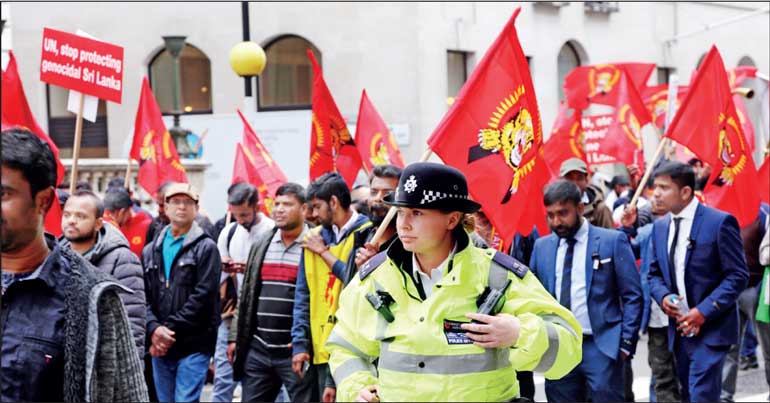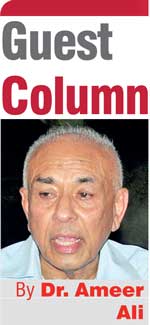Saturday Feb 14, 2026
Saturday Feb 14, 2026
Saturday, 26 August 2023 00:55 - - {{hitsCtrl.values.hits}}
 Behind the political pressure exerted by diaspora Tamils is the economic clout they command, which could be harnessed for investment purposes
Behind the political pressure exerted by diaspora Tamils is the economic clout they command, which could be harnessed for investment purposes
Once again the issue boils down to the nature of the system that governs the nation’s political, economic and socio-cultural development. RW does not have the courage to throw out the system with its constitution and usher in Sri Lanka to a new era. In fact, none of the existing political parties except NPP is advocating to rip the current constitution and draw a new one based on secular democratic principles with accountability and justice as its core values. Under such a constitution won’t 13A become redundant? If the diaspora Tamil community is really serious about seeing their kith and kin in Sri Lanka live peacefully with equal rights and justice then it should not fight for concessions like 13A under the new constitution but for the destruction of the whole constitution and the system that upholds it
 President Wickremesinghe’s initiative to implement the 13th Amendment stamped by India in 1987 has created a heat wave of controversy threatening to derail the move and enliven some bitter memories. Political Buddhism is leading the anti-13A campaign, and Mahanayakas, ultranationalist Sinhala politicians and surprisingly even a few intellectuals have joined the chorus to stop its implementation. Muslim leaders too have joined the bandwagon. Some critics are quite diplomatic and express their opposition by questioning the wisdom of the President for prioritising the issue of reconciliation and 13A at a time when the country demands the nation’s full attention to solve the economic crisis.
President Wickremesinghe’s initiative to implement the 13th Amendment stamped by India in 1987 has created a heat wave of controversy threatening to derail the move and enliven some bitter memories. Political Buddhism is leading the anti-13A campaign, and Mahanayakas, ultranationalist Sinhala politicians and surprisingly even a few intellectuals have joined the chorus to stop its implementation. Muslim leaders too have joined the bandwagon. Some critics are quite diplomatic and express their opposition by questioning the wisdom of the President for prioritising the issue of reconciliation and 13A at a time when the country demands the nation’s full attention to solve the economic crisis.
RW’s meeting with the Indian Prime Minister weeks ago and the subsequent announcement from Delhi to strengthen the connectivity between India and Sri Lanka to the extent of constructing a land bridge between the two countries had sent shivers of fear among Sinhala nationalists. But behind all this, is a hard fact less noted in public discussion, and that is the relentless push for its implementation from a resourceful Tamil diaspora community, which has grown into a force to be reckoned with in international circles.
Totalling almost one million in number, the Tamil diaspora community is spread in different parts of the English-speaking Western world with strong concentrations in Canada, UK, US, and Australia. This community, the product of almost seven decades of aggressive anti-Tamil policies and programs promoted by Sinhala nationalists, has organised itself into a centralised political body and acting as the international voice on behalf of Sri Lankan Tamils.
Just as Hitler’s Jewish genocide led to the holocaust, so did Sri Lankan Sinhala nationalism engender a Tamil exodus; and just as the expatriate Jews strived to preserve and develop their language and culture wherever they settled, worked hard to become economically and financially resourceful, and intellectually and professionally respectable by the communities among which they lived, so are the Sri Lankan diaspora Tamils dedicating themselves to spread their language and culture wherever they settled while persevering to excel intellectually, professionally and economically to become recognisable by the host communities.
And just as the Jews eventually became politically influential to win international backing for their demand for a homeland in Arab Palestine so are diaspora Tamils bringing pressure upon their governments and international agencies not to demand for a separate country, which they will never get as long as Tamil Nadu remains part of the Indian federation, but a solution to the Tamil question based on 13A. There is no better time for them to push for this solution than now when Sri Lanka is caught in a historic economic struggle. This development no doubt, has awakened Sri Lankan Sinhalese political leadership lately. That was what prompted the former president Gotabaya Rajapaksa (GR) to promise UN Secretary General Antonio Guterres in New York in 2021 that he would meet Tamil diaspora leaders for talks, although it never happened. Now, his successor RW too realises this and that explains his initiatives to implement the controversial amendment. Behind the political pressure exerted by diaspora Tamils is the economic clout they command, which could be harnessed for investment purposes. “The wealth of the Eelam Tamils of Diaspora is greater than the entire Sri Lankan economy,” claimed a representative from the Tamil American United Political Action Committee based in the US. That is certainly an exaggerated claim, but their financial strength is not in doubt. And it is this financial strength that has emboldened local Tamil leadership to agitate for a federal solution via 13A. And RW also realises that diaspora investment would help ameliorate the dearth of investment funds available and would enhance his economic recovery effort.
But to the Sinhala nationalists the economics behind 13A when combined with Prime Minister Modi’s resolve to strengthen people to people connectivity would mean, as one local political scientist headlined his article, “India-led north-east development and southern underdevelopment”. This is pure Sinhala political parochialism echoing in the guise of a demand for balanced economic development. But wasn’t the development equation reversed in favour of the south during the last seven decades or so? If one looks at the south biased development of the past, future north-east development would mean redressing the regional imbalance created by seven decades of communal politics. So long as one looks at economic development through a communal lens Sri Lanka will never get out of its economic misery.
GR also advocated that the solution to the Tamil issue was not devolution of power but economic development, and development according to him meant populating those provinces with more Sinhalese and constructing viharas. What is happening now in Kurundoor is his legacy.
But once again the issue boils down to the nature of the system that governs the nation’s political, economic and socio-cultural development. RW does not have the courage to throw out the system with its constitution and usher in Sri Lanka to a new era. In fact, none of the existing political parties except NPP is advocating to rip the current constitution and draw a new one based on secular democratic principles with accountability and justice as its core values. Under such a constitution won’t 13A become redundant? If the diaspora Tamil community is really serious about seeing their kith and kin in Sri Lanka live peacefully with equal rights and justice then it should not fight for concessions like 13A under the new constitution but for the destruction of the whole constitution and the system that upholds it.
The moment 13A is mentioned it sends jitters within another minority, Muslims, who have their own fears and grievances against the Tamils with whom they are living in north and east. Regrettably, local Tamil and Muslim leaders had done little so far to remove those fears through open dialogue. Tamil leaders hope to win their demands with the support of the diaspora half while Muslim leaders as usual are using 13A as a bargaining chip for special concessions from RW’s reactionary regime. This is part of their business politics. Also, how would 13A help the Indian Tamil community living in the highlands? They are the most oppressed lot in the whole country, but contribute most to the nation’s economy.
The politics and economics of 13A are part of the same reactionary paradigm that is governing this country since independence. Although 13A was inspired by India and legislated under duress its implementation would create more problems than it is intending to solve. And whether India’s BJP government controlled by big capital would compromise with its economic and strategic interests over Sri Lanka for the sake of implementing 13A is a sixty-four thousand dollars question. The time is therefore opportune to bring about a change with a clean slate.
(The writer is attached to Murdoch Business School, Murdoch University, Western Australia.)